
May 12
1820 Birth: Florence Nightingale: British nursing hero of the Crimean War:
Florence Nightingale earned the nickname The Lady With the Lamp for her tireless nursing of British soldiers during the Crimean War. Nightingale was born to wealthy English parents and proved to be a quick-witted and independent child.
In 1837 she felt she heard a call from God, though the nature of the calling was unclear. She became interested in nursing and, despite opposition from her parents, trained as a nurse and began work in a London clinic. When the Crimean War broke out in 1854, she led a group of three dozen nurses to Constantinople to serve in British military hospitals there. (This was controversial: female nurses had not served in such wartime field hospitals before.) No shrinking violet, she cajoled army officials to change terrible conditions in the hospitals, thus earning the gratitude of soldiers and a measure of public fame. When the war ended in 1856 she returned to London and continued her reform campaign there.
Her outspoken Notes on Matters Affecting the Health, Efficiency and Hospital Administration of the British Army (1857) and Notes on Hospitals (1859) helped create changes in hygiene and overall treatment of patients. She also founded the groundbreaking Nightingale Training School for nurses, and in later years published dozens of books and pamphlets on public health. Nightingale was awarded the Royal Red Cross by Queen Victoria in 1883, and in 1907 became the first woman to receive the Order of Merit.
According to the Florence Nightingale Museum, her parents were so wealthy they "toured Europe for two years on their honeymoon" . . . . Nightingale was named for Florence, Italy, the city of her birth . . . . Her older sister was born in Naples in 1819, and was given that city's ancient name of Parthenope... Florence Nightingale never married . . . . She is often compared to Civil War nurse Clara Barton . . . . Nightingale was played by actress Anna Neagle in the 1951 film The Lady With a Lamp.
1889 Birth: Otto Frank: German writer, father of Anne Frank.
1898 Spanish-American War:

A squadron of 12 US ships commanded by Rear Admiral William T. Sampson bombards San Juan, Puerto Rico. (Trask)
1915 World War I: Various:
Bryce Report on German Atrocities in Belgium:
Although the neutrality of Belgium had been guaranteed by a treaty signed in 1839, to which France, Prussia, and Great Britain were parties, and although, apart altogether from any duties imposed by treaty, no belligerent nation has any right to claim a passage for its army across the territory of a neutral state, the position which Belgium held between the German Empire and France had obliged her to consider the possibility that in the event of a war between these two Powers her neutrality might not be respected. In 1911 the Belgian Minister at Berlin had requested an assurance from Germany that she would observe the Treaty of 1839; and the Chancellor of the Empire had declared that Germany had no intention of violating Belgian neutrality. [For further details, Click here.]
List Regiment:

Gefreiter Adolf Hitler's 16 Reserve Infantry Regiment continues to occupy a position at Fromelles (pictured above in a drawing by Hitler), which is on a level field with water channels, willow trees and willow stalks. In the distance towards the enemy lines lies an insignificant wood with barbed wire entanglements. Under the direction of their defense-minded commander, Lieutenant General Gustav Scanzoni von Lichtenfels, the regiment works ceaselessly day and night to further fortify their position at Fromelles while fighting off repeated assaults by the enemy. [For further details, Click here.]
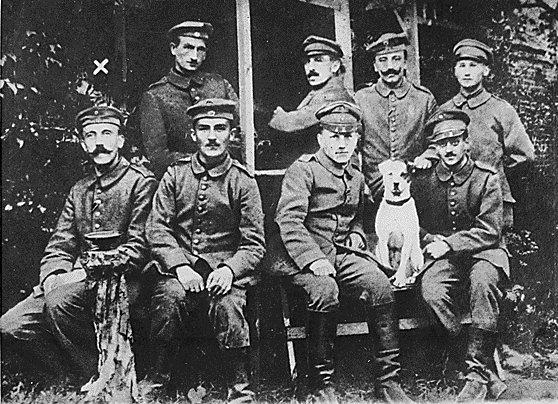
1916 World War I: List Regiment: Gefreiter Adolf Hitler endures trench warfare in Flanders (Artois) with 3 Company, 16 Reserve Infantry Regiment [List Regiment]. [For further details, Click here.]
1917 World War I: Various:
Tenth Battle of the Isonzo: The Italians once again attempt to battle their way over mountainous terrain. Casualties are huge: 157,000 Italian and 75,000 Austrians.
List Regiment: Gefreiter Adolf Hitler's 16 Reserve Infantry Regiment , 3 Company, participate in the Arras action, being redeployed east of Vimy Ridge. [For further details, Click here.]
1918 World War I: Various:
Germany and Austria-Hungary renew alliance:
On this day in 1918, the rulers of Germany and Austria-Hungary, Kaiser Wilhelm II and Emperor Karl I, meet to sign an agreement pledging their mutual allegiance and determining to share the economic benefits from their relationship with the newly independent state of Ukraine, one of the most fertile and prosperous regions of the former Russian Empire. [For further details, Click here]
List Regiment: Gefreiter Adolf Hitler's 16th RIR is sent back to hold a sector near an earlier position at Laon. [For further details, Click here.]
Birth: Julius Rosenberg: American engineer executed with his wife for espionage in 1953.
1921 Birth: Joseph Beuys: German artist:
In about 1936, Beuys joined the Hitler Youth, commenting later in his life: "everyone went to church, and everyone went to the Hitler Youth." With the outbreak of World War II, he joined the Luftwaffe as a volunteer. When he was shot down while flying over the Crimea on May 16, 1944, he was lightly injured. A few days later, maybe the next day, he was treated in a German field hospital (Feldlazarett 179) for two weeks.
Later, Beuys told various stories as to how he was subsequently rescued by nomad Tatars, who supposedly kept him warm by covering him with fat and wrapping him in felt. The story, as related by Beuys, was later disproved. However, because of hallucinations while in hospital, his possibly imagined time with Tatars would prove pivotal in his life, and would influence much of his later art. After he recovered from the injuries, he fought as a paratrooper in western Germany, and received several military awards, including the Iron Cross (Second and First Class) and the golden Wound Badge. In the last days of the war he was taken prisoner by British troops.
1926 Various:
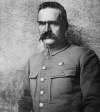
Poland: General Pilsudski:
Believing that the unstable Polish parliamentary system is endangering Poland, Pilsudski seizes power, and forms an authoritarian government. He works for good relations with both Germany and Russia, but an alliance with neither.
[Aided] by socialist railwaymen whose strike paralyzed communications and prevented government reinforcements from reaching Warsaw, he initiated the Sanacja government (1926-1939) conducted at times by authoritarian means directed at restoring moral 'health' to public life. Although till his death in 1935 he played a preponderant role in Poland's government, his formal offices, apart from two stints as prime minister in 1926-28 and 1930 were for the most part limited to those of minister of defense and inspector-general of the armed forces. The adoption of a new Polish constitution in April 1935, tailored by Pilsudski's supporters to his specifications, providing for a strong presidency came too late for Pilsudski to seek that office; but the April Constitution would serve Poland up to the outbreak of World War II and would carry its Government in Exile through to the end of the war and beyond. [For further details, Click here.]
The General Strike collapses in England after only nine days.
1932 USA: The body of the kidnapped son of Charles and Anne Lindbergh is found in a wooded area of Hopewell, N.J.
1933 Various:
Germany: Resistance:
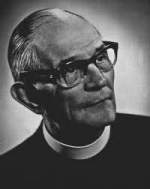
The Young Reform Movement is founded in Germany by Reverend Martin Niemoeller. (THP)
Danzig: Local trade union headquarters seized by Nazis.
New Deal: The US Federal Emergency Relief Act and Agricultural Adjustment Act are passed. The dollar is taken off the Gold Standard at $35 per ounce, and is allowed to float. It will have devalued significantly by the following year.
1935 Death: Marshal Josef Pilsudski:
As de Gaulle was later to do in France, [Pilsudski] sought to maintain his country's independence on the international scene. When Adolf Hitler came to power in Germany in January 1933, Pilsudski sounded out Poland's ally, France, regarding the possibility of joint military action against Germany, which had been openly rearming in violation of the Versailles Treaty. When France declined, Pilsudski was compelled to sign a nonaggression pact with Germany in January 1934. (He had already done so with the Soviet Union in 1932.) He was acutely aware of the shakiness of the nonaggression pacts, remarking sarcastically: "The question remains, which of the stools will we fall off first." Ably assisted by his protégé, Minister of Foreign Affairs Jozef Beck, he sought support for Poland in alliances with western powers—France and Great Britain—and with friendly, if less powerful, neighbors: Romania and Hungary. Hitler repeatedly suggested a German-Polish alliance against the Soviets, but Pilsudski ignored the proposal. He sought time for Poland to prepare to fight when the necessity arose . . . .
By 1935 Pilsudski had, unbeknown to the public, been for several years in declining health. So much the greater was the shock at the passing of the man about whom Joseph Conrad had said: "He was the only great man to emerge on the scene during the [First World] war."
1937 United Kingdom: George VI crowned at Westminster Abbey:
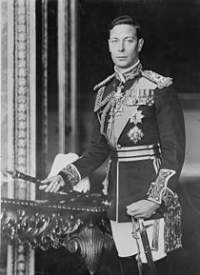
At London's Westminster Abbey, George VI and his consort, Lady Elizabeth, are crowned king and queen of the United Kingdom as part of a coronation ceremony that dates back more than a millennium.
George, who studied at Dartmouth Naval College and served in World War I, ascended to the throne after his elder brother, King Edward VIII, abdicated on December 11, 1936. Edward, who was the first English monarch to voluntarily relinquish the English throne, agreed to give up his title in the face of widespread criticism of his desire to marry Wallis Warfield Simpson, an American divorcee.
In 1939, King George became the first British monarch to visit America and Canada. During World War II, he worked to keep up British morale by visiting bombed areas and touring war zones. George and Elizabeth also remained in bomb-damaged Buckingham Palace during the war, shunning the relative safety of the countryside, and George made a series of important morale-boosting radio broadcasts, for which he overcame a speech impediment.
After the war, the royal family visited South Africa, but a planned tour of Australia and New Zealand had to be postponed indefinitely when the king fell ill in 1949. Despite his illness, he continued to perform state duties until his death in 1952. He was succeeded by his first-born daughter, who was crowned Queen Elizabeth II in June 1953. (History.com)
[The King was, perhaps, the most loved and respected monarch in British history; Elizabeth, the Queen Mother continued in her popularity until her death, at the age of 101, in March, 2002.—Ed.]
1939 World War II: Britain and Turkey sign a mutual assistance pact.
1940 World War II: German tanks roll into France from Belgium, through the Ardennes Forest. The French had thought that these wooded hills are too dense to pass through, and had inadequate antitank and antiaircraft guns ready. The French are stunned; their tank forces poorly organized and their planes greatly outnumbered, the result is inevitable. 1941 World War II: Various:
Hitler backs Rashid Ali:
Adolf Hitler sends two bombers to Iraq to support Rashid Ali al-Gailani in his revolt against Britain, which is trying to enforce a previously agreed upon Anglo-Iraqi alliance. [For further details, Click here]
Konrad Zuse presents the Z3 in Berlin, the world's first working programmable, fully automatic computer.
Rudolf Hess: Flight to England: J. R. Rees reports to Churchill:
Hess said he was horrified at the heavy raids on London in 1940, and loathed the thought of killing young children and their mothers. This feeling was intensified when he contemplated his own wife and child, and led to the idea of flying to Britain and arranging peace with the large anti-war faction he thought existed in this country . . . . He was insistent that he would have no dealings with the 'clique'—the government now in power—who would do everything possible to thwart him, but he was very vague as to what statesmen should replace them, and seemed to be extremely ill-informed as to the names and relative importance of our politicians.
Professor Albrecht Haushofer—Rudolf Hess' friend and adviser—is arrested by the Gestapo and taken to Berchtesgaden. He is ordered to write a full report on everything he knows about Hess's flight. Hitler then orders that Haushofer be sent to the Prince Albrecht Strasse Gestapo Prison in Berlin. He will be intensely interrogated by the head of the Gestapo, Heinrich Mueller. Haushofer's Report: The circle of English individuals whom I have known very well for years, and whose utilization on behalf of a German-English understanding in the years from 1934 to 1938 was the core of my activity in England, comprises the following groups and persons: 1942 World War II: Various:
USA: A Nazi U-boat sinks an American cargo ship at mouth of Mississippi River.
In the eastern Ukraine, the Soviet Army initiates a major offensive. During the battle the Soviets will capture the city of Kharkov from the German Army, only to be encircled and destroyed. Soviet forces under the command of Marshal Semyon Timoshenko launched an offensive into the German Sixth Army, initiating a bloody 17-day battle which resulted in the loss of over 200,000 Red Army personnel. In the end, it would gain Friedrich Paulus his first field victory and open the path for the eventual operations which led to the Battle of Stalingrad and Operation Blue.
1943 World War II: Various:
North Africa: The war in North Africa is over as all organized Axis resistance in Tunisia ends and the German commander in North Africa, General von Arnim, surrenders: Allied Headquarters in North Africa, May 12 -- The war in Africa is over, it was officially announced tonight.
Col. Gen. Dietloff von Arnim, the Prussian Commander in Chief of the Axis forces in North Africa, has been captured by the British, apparently on Cap Bon. In all, 150,000 prisoners are believed to have been taken since May 5, when the final assaults on Tunis and Bizerte began. Twelve generals have been captured.
[Of the 150,000 captives, it was estimated that some 110,000 were Germans and the remainder Italians, The United Press said.]
This brings to 400,000 the total of Axis prisoners taken since the North African campaign aproached Lieut. Gen. Sir Bernard Freyberg for peace terms somewhere north of Enfidaville, the New Zealand commander said two words: "Unconditional surrender."
General von Sponeck announced that he would fight to his last bullet. Then, that Prussian point of military honor having began satisfied by fire from British guns heavier than his own, he surrendered.
That the end would come within a few hours was apparent by noon today, after British tanks, with infantry hanging on their sides, had toured the coast roads of what might have been the strong fortress of Cap Bon in virtual joyrides. Every time a tank pointed its gun, hordes of prisoners came in to give up. Moreover, the Germans and Italians had begun surrendering en masse to the French commanded by General Mathenet.
The French, defeated in 1940, received the surrender of 25,000 Axis soldiers, including two German major generals. The Americans announced today that they had taken 37,998 prisoners, of whom 33,498 were Germans.
Reichsfuehrer Hitler's disastrous adventure in North Africa can at last be gaged in full. It was a complete and final disaster and few, if any, of his men escaped. The American, British and French all played a major part in the final victory. (NYT)
[See also: The Mediterranean Strategy.]
Second Front: Churchill visits Roosevelt in Washington to discuss the problems of a second front in Western Europe, to take pressure off the Soviets and break the Axis states. 1944 World War II: Various:
From a letter from the Chief of Office Group D of WVHA: There is cause to call attention to the fact that in every case permission for assignment has to be requested here before assignment of prisoners is made for experimental purposes. To be included in this request are number, kind of custody, and in case of Aryan prisoners, exact personal data, file number in the Reich Security Main Office, and the reason for detainment in the concentration camp. As from now, I explicitly forbid assignment of prisoners for experimental purposes without permission.
Yugoslavia: President Roosevelt writes to King Peter, politely ordering him to dismiss General Draza Mihailovich, the legendary hero of the Yugoslavian resistance, as Minister of National Defense, and to replace him with Josip Broz (Tito), the Communist leader. Several German units in Yugoslavia continue to fight for a few more days, but the war in Europe is over.
1945: Wilhelm Keitel surrenders to the Allies: From The Memoirs of Field Marshal Keitel: I was to surrender as a prisoner of war, and would be flown out at 2:00 that afternoon — in two hours time. I was to turn over my official business to Colonel-General [Alfred] Jodl; I was to be allowed to take with me one personal staff officer, a batman, and 300 lbs. of baggage. I stood up, saluted briefly with my Field Marshal's baton, and drove back to headquarters . . . . 1946: The Rand Project, a part of the Douglas Aircraft Corporation that will eventually become the Rand Corporation, outlines a proposal to the Air Material Command for a 500-pound satellite to be launched by a rocket based on the V-2. They recommend that the satellite contain meteorological research, communications, and reconnaissance equipment, and estimate that the cost will be around 150 million dollars. (Piszkiewicz) 1949 Cold War: Berlin blockade lifted:
On May 12, 1949, an early crisis of the Cold War comes to an end when the Soviet Union lifts its 11-month blockade against West Berlin. The blockade had been broken by a massive U.S.-British airlift of vital supplies to West Berlin's two million citizens. 1955 Spandau Prison: From Spandau: The Secret Diaries by Albert Speer: For a few hours, [Erich] Raeder has a speech impediment. Like [Constantin von] Neurath during his last months, he is no longer allowed to work. He sits in the garden on his stool twice a day for an hour, staring into space, lost in thought. The rest of the time he is locked in his cell. In spite of all our differences these past years, I am deeply moved by the sight of this doomed old man. Raeder no longer wants to gloss over the state of his health; I can't understand why he has done so up to now. (Speer II) 1965 West Germany and Israel establish diplomatic relations. (AP)
2009 John Demjanjuk: The accused Nazi concentration camp guard arrives in Germany to stand trial for his involvement in the deaths of 29,000 Jews at Sobibor. 
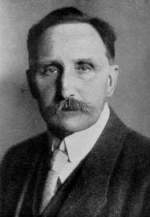
1. A leading group of younger Conservatives (many of them Scotsmen). Among them are: the Duke of Hamilton—up to the date of his father's death, Lord Clydesdale—Conservative Member of Parliament; the Parliamentary Private Secretary of Neville Chamberlain, Lord Dunglass; the present Under Secretary of State in the Air Ministry, Balfour; the present Under Secretary of State in the Ministry of Education, Lindsay (National Labour); the present Under Secretary of State in the Ministry for Scotland, Wedderburn. Close ties link this circle with the Court. The younger brother of the Duke of Hamilton is closely related to the present Queen through his wife; the mother-in-law of the Duke of Hamilton, the Duchess of Northumberland, is the Mistress of the Robes; her brother-in-law, Lord Eustace Percy, was several times a member of the Cabinet and is still today an influential member of the Conservative Party (especially close to former Prime Minister Baldwin).
There are close connections between this circle and important groups of the older Conservatives, as for example the Stanley family (Lord Derby, Oliver Stanley) and Astor (the last is owner of The Times). The young Astor, likewise a Member of Parliament, was Parliamentary Private Secretary to the former Foreign and Interior Minister, Sir Samuel Hoare, at present English Ambassador in Madrid. I have known almost all of the persons mentioned for years and from close personal contact. The present Under Secretary of State of the Foreign Office, Butler, also belongs here; in spite of many of his public utterances he is not a follower of Churchill or Eden. Numerous connections lead from most of those named to Lord Halifax, to whom I likewise had personal access.
2. The so-called "Round Table" circle of younger imperialists (particularly colonial and Empire politicians), whose most important personage was Lord Lothian.
3. A group of the "Ministerialdirektoren" in the Foreign Office. The most important of these were Strang, the chief of the Central European Department, and O'Malley, the chief of the South Eastern Department and afterwards Minister in Budapest. There was hardly one of those named who was not at least occasionally in favor of a German-English understanding. Although most of them in 1939 finally considered that war was inevitable, it was nevertheless reasonable to think of these persons if one thought the moment had come for investigating the possibility of an inclination to make peace.
Therefore when the Deputy of the Fuehrer, Reich Minister Hess, asked me in the autumn of...about possibilities of gaining access to possibly reasonable Englishmen, I suggested two concrete possibilities for establishing contacts. It seemed to me that the following could be considered for this:
A. Personal contact with Lothian, Hoare, or O'Malley, all three of whom were accessible in neutral countries.
B. Contact by letter with one of my friends in England. For this purpose the Duke of Hamilton was considered in the first place, since my connection with him was so firm and personal that I could suppose he would understand a letter addressed to him even if it were formulated in very veiled language. Reich Minister Hess decided in favor of the second possibility; I wrote a letter to the Duke of Hamilton at the end of September 1940 and its dispatch to Lisbon was arranged by the Deputy Fuehrer. I did not learn whether the letter reached the addressee. The possibilities of its being lost en route from Lisbon to England are not small, after all. (SSN)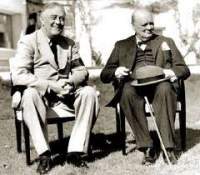

I took leave of [Grand Admiral Karl] Doenitz, who had already been briefed on what was to happen, and selected Lieutenant-Colonel John von Freyend, and Monch, to accompany me, thereby ensuring a considerably less arduous captivity for them. I handed my personal papers and keys to Jodl, and handed Szimonski ... one or two things and a letter for my wife, which were to be flown down to Berchtesgaden in the courier plane.
Unfortunately, the British later seized everything ... even my ... bank passbook, and the letter to my wife. We took off for a destination not disclosed to us and, after flying right across Germany, landed that evening in Luxembourg airport; there I was treated as a prisoner-of-war for the first time, and taken to the internment camp in the Palace Hotel, Mondorf, where [Arthur] Seyss-Inquart had already arrived. In Flensburg, I had been my own master; I drove to the airfield in my own car; in those two unguarded hours, I could have put an end to my life, and nobody could have stopped me. The thought never occurred to me, as I never dreamed that such a 'via dolorosa' lay ahead of me, with this tragic end in Nuremberg. 
[For further details, Click here]
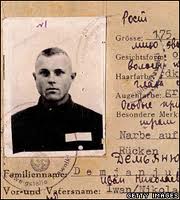
2011 John Demjanjuk: A German court convicts retired U.S. autoworker John Demjanjuk of being an accessory to the murder of tens of thousands of Jews as a Nazi death camp guard. (Demjanjuk, who maintained his innocence, dies in 2012.) (UP)
Edited by Levi Bookin (Copy editor) Click to join 3rdReichStudies Disclaimer: This site includes diverse and controversial materials--such as excerpts from the writings of racists and anti-Semites--so that its readers can learn the nature and extent of hate and anti-Semitic discourse. It is our sincere belief that only the informed citizen can prevail over the ignorance of Racialist "thought." Far from approving these writings, this site condemns racism in all of its forms and manifestations.
levi.bookin@gmail.com











Fair Use Notice: This site may contain copyrighted material the use of which has not always been specifically authorized by the copyright owner. We are making such material available in our efforts to advance understanding of historical, political, human rights, economic, democracy, scientific, environmental, and social justice issues, etc. We believe this constitutes a "fair use" of any such copyrighted material as provided for in section 107 of the US Copyright Law. In accordance with Title 17 U.S.C. Section 107, the material on this site is distributed without profit to those who have expressed a prior interest in receiving the included information for research and educational purposes. If you wish to use copyrighted material from this site for purposes of your own that go beyond 'fair use', you must obtain permission from the copyright owner.
Please Note: The list-owner and the moderator of 3rdReichStudies are not responsible for, and do not necessarily approve of, the random ads placed on our pages by our web server. They are the unfortunate price one pays for a 'free' website.



